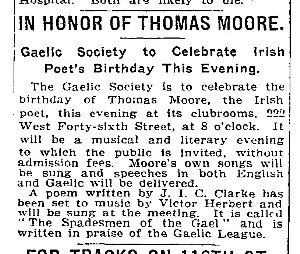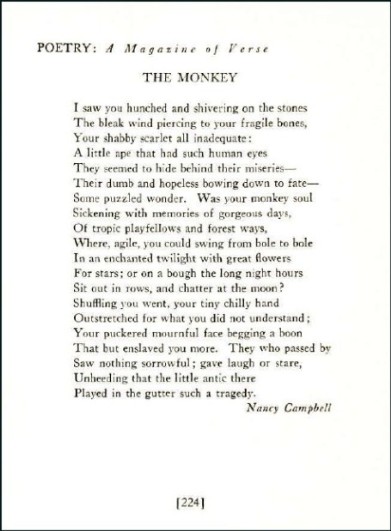Non-Sligo Poets - Sligo Poets
Main menu:
- Home
-
1912
- 1912
- Sligo Poetry 1912
-
1913
- 1913
- Sligo Poetry 1913
-
1914
- 1914
- Sligo Poetry 1914
-
1915
- 1915
-
Sligo Poetry 1915
- Sligo Newspaper Poems
- Sligo Champion
- Sligo Independent
- Sligo Nationalist
-
1916
- 1916
-
Sligo Poetry 1916
- Sligo Newspaper Poems 1916
- Sligo Champion
- Sligo Nationalist
- Sligo Independent
- The Poets
- Bibliography
- The Author

Poems not written by Sligo authors included in the Sligo Champion 1912.
Sligo Champion 15 June 1912
THE SPADESMEN OF THE GAEL
League of the Gael, its praise be sung!
God mark them all to grace,
Who sound in Ireland’s ancient tongue
The watchword of our race!
They’ve sworn by all the saints above
To win it from eclipse,
That Granua’s burning speech of love
Shall flame upon our lips.
New Irish wit; old Irish lore,
Our heroes and our art,
The faith we’ve kept, the flags we bore
Shall warm us to the heart.
Too long we’ve only dug the clay,
And sown and reaped in dole,
So let us crown neath bays today
Our spademen of the soul.
They plough the field of olden times,
And seek beneath the clod,
They write the shamrock into rhymes
And versify the sod.
They are digging in the blessed loam
Around the fairy trees;
They’ve snared the silver of the foam
For Banba of the seas.
They’ve plumbed the depths of Irish eyes
Wherein the laughter gleams;
They’ve lured the blue of Irish skies
To weave in Irish dreams.
They’ve chased the deer with Oisin’s hound
Across the hilltops cold;
They’ve followed, followed till they found
The rainbow’s crock of gold.
They’ve stolen to where the redbreasts sing;
They’ve chimed the sidhe’s wild bells;
They’ve heard white saints a’whispering
About the holy wells.
They’ve listened till they caught the tone
Of Erin’s old romance;
They’ve lifted up the fairies’ stone
To see the fairies dance.
They’ve brought us back the airy swirl
Of lissome jig and reel,
The wrestler’s throw, the lusty hurl,
The pikeman’s whirling steel.
New strings in Ireland’s harp they’ve set,
They’ve waked the piper’s strain.
Not with vain tears their cheeks are wet,
But fresh’ning Irish rain.
They’ve freed King Brian’s sword from rust;
They’ve gripped Finn’s mighty fist;
They’ve won Cuchulain from the dust,
Queen Maeve from out the mist.
Their task, like suns upon their course,
Is from their hearts to give,
To Ireland’s soul the Godlike force
That makes a nation live.
J. I. C. CLARKE
Joseph Ignatius Constantine Clarke (1846–1927) was born in Dun Laoghaire, County Dublin. The family moved to London when he was twelve years old. He worked there as a clerk in the Board of Trade.
In 1868 he went to Paris and then emigrated to America. In the USA Clark became a noted journalist, poet and playwright. He was also a member of the Irish Republican Brotherhood.
Among his publications were Robert Emmet: A Tragedy of Irish History (1888) and his autobiography My Life and Memories (1925).
This poem was written in praise of the work of the Gaelic League. It was also published in the Roscommon Herald, on the same date, 15 June 1912 where it is credited "from the Gaelic American, June 1st 1912". Presumably this was also the souce for the Sligo Champion.

The New York Times of 26 May 1912 reported that this poem had been set to music by Irish-
This may be the reason for its inclusion in the Sligo Champion.
Clarke's story Her Majesty was made into a film The Gilded Cage (1916) and he is included in the writing credits.
Sligo Champion 9 November 1912
De Profundis
I listen and hear them appealing,
The voice of the spirits in pain
In the chill that comes over us stealing
With the sob of the pitiful rain;
The sobbing cold rain of November,
Like the voice on one crying: “Remember,
Remember the souls of the dead!
In the rustle of leaves that are falling
With a whispering sign at our feet,
There’s a voice from the past softly calling,
Mournfully, pleadingly sweet,
“O friends in the month of November
You at least who once loved us—Remember,
Remember the souls of the dead!
In the midnight when others are sleeping,
And the moonlight shines down through the dark
And a restlessness over us creeping
Makes us wakeful and watchful—then hark!
In the lonely cold nights of November
How they seem to beseech us: Remember,
Remember the souls of the dead!
Tis the burden of ocean’s sad dirges,
A reproach and incessantly saith;
We loved youn while living,” it urges,
“O do not forget us in death!”
Not along in the month of November
But till you too need mercy—Remember
Remember the souls of the dead!
Jean E. U. Nealis
Jean E. U. Nealis (1842-
Jane Elizabeth Ursula Wilkinson was born in Canada and eloped with an Irish emigrant, Hugh Nealis, whom she married. She became a Catholic and began to write poetry. Her collection, Drift, was published in 1884. They moved to the USA and her husband died in 1904.
This poem, published in the Champion at the start of November, for Catholics the month of the Holy Souls, does not appear in Drift and was presumably copied from another publication.
There is no suggestion of a Sligo connection with this poet but her husband's surname Nealis was more common in Sligo than elsewhere. Of the 50 Nealis found in a simple search of the 1901 Census, 26 are in Sligo, 15 in Mayo.
More information on this poet.

Sligo Champion 21 December 1912
The Road to Bethlehem
MARY :
Where will my little Lamb be laid
When he shall come to me ?
JOSEPH :
God has some royal pavilion made
To welcome Him and thee.
MARY:
I have a strange thought in my head,
(So dark and cold 's the way).
Maybe in some poor lowly shed
My little Lamb I'll lay.
JOSEPH :
Not so : He is the conqueror,
To take King David's crown ;
And many a heavenly messenger
Shall herald his renown.
MARY:
Already is the angelic crowd
Awakening in the sky,
But still on nothing fine or proud
God's Son and mine shall lie.
And though He come a-
Salvation to impart,
First He will be a little thing
That cries upon my heart
Nancy Campbell
(From “Agnus Dei.” Maunsell & Co., Ltd. 6d net.)
Nancy Campbell (1886-
She published some collections of poetry, The Little People (1910) and Agnus Dei (1912).
She had two poems published in Harriet Monroe's magazine Poetry in 1915, see one below.
More here.
